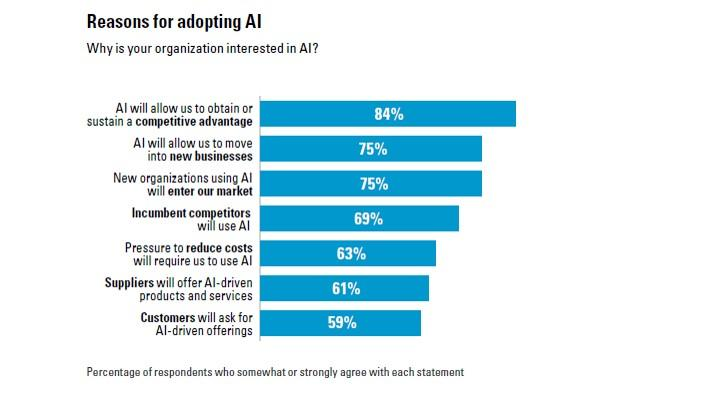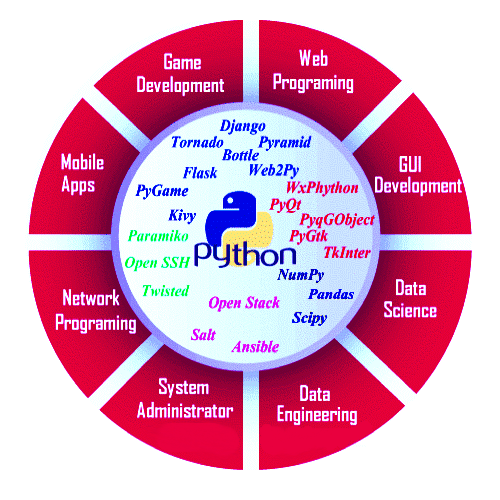The artificial intelligence global market is expected to reach $190 billion by 2025. The bright future of this technology allures every entrepreneur. In fact, when we think about the technologies that are going to rule in the future, the one name that comes to our minds is ~ Artificial intelligence.
AI along with its subsets like machine learning and deep learning is making such things possible which were unimaginable by humankind a few years back. It is affecting the realities and sometimes changing reality completely.

The power of AI is well acknowledged by businesses as 84% of respondents in a study voted that they believe artificial intelligence will allow them to enjoy a competitive edge over competitors.
Although entrepreneurs have an idea about AI but what most of them lack is proper implementation. The use of optimum programming tools for a complex technology like AI can create wonders for the world of business.
Every custom web developer knows that a python is an apt tool for building AI-enabled -applications. The language has been used to create 126,424 websites so far. Since its launch in the late 1980s, python has seen remarkable growth not only in users but in applications too.
Python is the favorite language for software developers to create applications that have artificial intelligence, machine learning, etc features embedded in them. But there are reasons behind everything.
This blog is written with the intent to unveil these reasons. Let’s explore why python is extensively used in AI-enabled software development services.
Python for AI is a perfect partner, here are the top reasons:

Libraries are pre-written codes in a module or group of modules that allow Python developers to perform certain functions. Python has such libraries in its bucket that support artificial intelligence development.
So, it becomes convenient for developers to write codes for these technologies. Some of these libraries are:
Scipy: This library is used for advanced computing
Scikit-learn: This library can be used to handle ML algorithms like regression, classification, clustering, etc.
Keras: This library can be used in deep learning development as it allows fast prototyping and calculations.
Pybrain: This library is used in machine learning development as it is for unsupervised, neural networks, and reinforcement learning.
TensorFlow: It is another library that is used for deep learning by utilizing neural networks with large datasets.
These libraries make python language the best to write codes for AI and ML. python developers get these easy to use and easy to implement libraries that provide the convenience to create AI apps.

Python is an extremely flexible language that gives you an option to choose between OOPs and scripting approaches. It’s the biggest advantage for software developers who are struggling with the algorithms because for python they can use IDE to check most codes.
Moreover, python developers have the option to choose or combine different programming styles. Some of these styles are Object-oriented style, functional style, imperative style, procedural style, etc.
This allows developers to enjoy a comfortable environment wherein the situations are under their control. Apart from this, flexibility also decreases the risk of errors and mistakes.
Python is witnessing steady growth for a long time now. Here is a graph by StackOverflow that shows the growth graph of major programming languages. Python can be seen as the fastest-growing programming tool.

This is because python is not hard to learn or execute. The entry-level barrier is quite low for this language which allows the data scientists to code for AI themselves. It eliminates the need to invest time in learning this language.
AI development, as well as machine learning services, have complex systems that are simplified with python as its syntax is extremely simple. The overall complex tasks get easier with python’s simple syntax mostly compare with the English language.
Along with being flexible, python is versatile too. This means that python codes can run on various platforms with many efforts. The web developers only need to make minute changes in codes to run them on separate platforms.
Platforms including Linux, Windows, macOS, Unix, and many others. The codes can be executed on any platform by very little modification. It makes the process simple and time-saving.
The larger the community, the more support developers will get. The open-source language has many beginners but what makes it different from others is its support by professional developers. Hence, the starters find it easy to get their queries resolved.
According to the stack overflow website which is used by millions of professional developers, python is among the most loved programming languages in 2019. Here is the graph to depict the same:

The huge number of users provides plenty of tutorials to create bug-free software. This creates a reliable web development using python as there are very little chances of getting stuck in between writing codes. The limitless support from the community allows flawless and seamless python development.
Undoubtedly, python is a strong back for the development of apps created with artificial intelligence technology. This language possesses the features to build dynamic, complex and competitive AI-enabled apps.
It’s crystal clear that python is the best programming tool to choose for the development of your AI-enabled apps. For further assistance, you can consult with a python development company which will suggest you according to your individual needs.
In case you have something to add about this perfect combination of python and AI then you can share with us in the comment section below. I believe that knowledge increases when shared. Happy reading and thinking!
AI along with its subsets like machine learning and deep learning is making such things possible which were unimaginable by humankind a few years back. It is affecting the realities and sometimes changing reality completely.

The power of AI is well acknowledged by businesses as 84% of respondents in a study voted that they believe artificial intelligence will allow them to enjoy a competitive edge over competitors.
Although entrepreneurs have an idea about AI but what most of them lack is proper implementation. The use of optimum programming tools for a complex technology like AI can create wonders for the world of business.
Every custom web developer knows that a python is an apt tool for building AI-enabled -applications. The language has been used to create 126,424 websites so far. Since its launch in the late 1980s, python has seen remarkable growth not only in users but in applications too.
Python is the favorite language for software developers to create applications that have artificial intelligence, machine learning, etc features embedded in them. But there are reasons behind everything.
This blog is written with the intent to unveil these reasons. Let’s explore why python is extensively used in AI-enabled software development services.
Python for AI is a perfect partner, here are the top reasons:
Python for AI #1: Supportive library ecosystem

Libraries are pre-written codes in a module or group of modules that allow Python developers to perform certain functions. Python has such libraries in its bucket that support artificial intelligence development.
So, it becomes convenient for developers to write codes for these technologies. Some of these libraries are:
Scipy: This library is used for advanced computing
Scikit-learn: This library can be used to handle ML algorithms like regression, classification, clustering, etc.
Keras: This library can be used in deep learning development as it allows fast prototyping and calculations.
Pybrain: This library is used in machine learning development as it is for unsupervised, neural networks, and reinforcement learning.
TensorFlow: It is another library that is used for deep learning by utilizing neural networks with large datasets.
These libraries make python language the best to write codes for AI and ML. python developers get these easy to use and easy to implement libraries that provide the convenience to create AI apps.
Python for AI #2: Flexible language

Python is an extremely flexible language that gives you an option to choose between OOPs and scripting approaches. It’s the biggest advantage for software developers who are struggling with the algorithms because for python they can use IDE to check most codes.
Moreover, python developers have the option to choose or combine different programming styles. Some of these styles are Object-oriented style, functional style, imperative style, procedural style, etc.
This allows developers to enjoy a comfortable environment wherein the situations are under their control. Apart from this, flexibility also decreases the risk of errors and mistakes.
Python for AI #3: Easy adoption
Python is witnessing steady growth for a long time now. Here is a graph by StackOverflow that shows the growth graph of major programming languages. Python can be seen as the fastest-growing programming tool.

This is because python is not hard to learn or execute. The entry-level barrier is quite low for this language which allows the data scientists to code for AI themselves. It eliminates the need to invest time in learning this language.
AI development, as well as machine learning services, have complex systems that are simplified with python as its syntax is extremely simple. The overall complex tasks get easier with python’s simple syntax mostly compare with the English language.
Python for AI #4: No platform restriction
Along with being flexible, python is versatile too. This means that python codes can run on various platforms with many efforts. The web developers only need to make minute changes in codes to run them on separate platforms.
Platforms including Linux, Windows, macOS, Unix, and many others. The codes can be executed on any platform by very little modification. It makes the process simple and time-saving.
Python for AI #5: Vast community
The larger the community, the more support developers will get. The open-source language has many beginners but what makes it different from others is its support by professional developers. Hence, the starters find it easy to get their queries resolved.
According to the stack overflow website which is used by millions of professional developers, python is among the most loved programming languages in 2019. Here is the graph to depict the same:

The huge number of users provides plenty of tutorials to create bug-free software. This creates a reliable web development using python as there are very little chances of getting stuck in between writing codes. The limitless support from the community allows flawless and seamless python development.
Conclusion:
Undoubtedly, python is a strong back for the development of apps created with artificial intelligence technology. This language possesses the features to build dynamic, complex and competitive AI-enabled apps.
It’s crystal clear that python is the best programming tool to choose for the development of your AI-enabled apps. For further assistance, you can consult with a python development company which will suggest you according to your individual needs.
In case you have something to add about this perfect combination of python and AI then you can share with us in the comment section below. I believe that knowledge increases when shared. Happy reading and thinking!